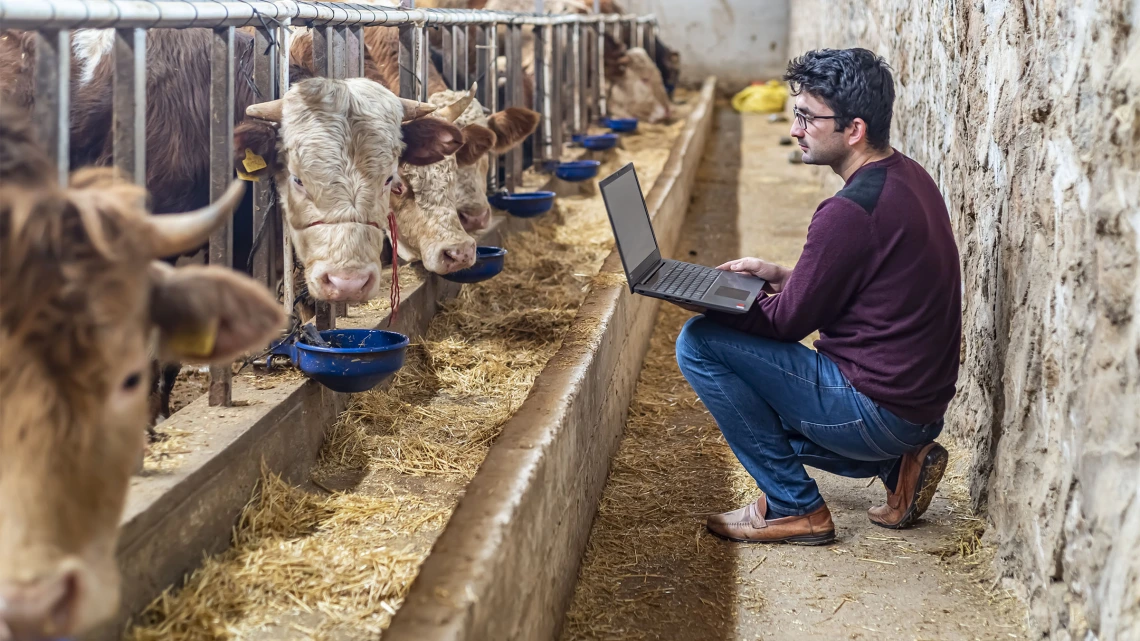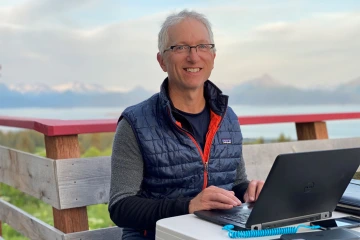Investigating Human, Animal and Environmental Connections
One Health starts with the knowledge that human health is interconnected with environmental and animal health.

The intersection of veterinary, environmental and human health is the basis for the new field of research called One Health.
The more we understand about human health, the more we see that it is deeply intertwined with the health of animals and the environment. This new field of research, called One Health, looks at human health in the context of these connections between people and the natural world.
One Health researchers study a range of critical problems, such as water quality, pollutants in the environment, and the transfer of diseases from animals to humans, called zoonotic diseases. Using this comprehensive approach, researchers can investigate how the environment impacts human health and work toward solutions to fight disease and other negative health effects. The SARS-CoV-2 virus, which has a zoonotic origin, presents a timely example of how we are all globally connected to each other and the environment.
One Health Research Initiative
The new public health focus on One Health at UArizona Mel and Enid Zuckerman College of Public Health affirms and enhances this approach. Faculty, especially in the field of exposure science, have been conducting research that investigates the impacts of environmental pollution on human health for many years, working with tribes, farmworkers, firefighters, and many others in Arizona and globally.

Frank von Hippel will lead the new One Health research team.
He uses locally occurring wildlife as models for human exposure and disease to track contaminants, focusing on health disparities experienced by vulnerable populations. To engage impacted communities with the research and the outcomes, Dr. von Hippel employs a Community Based Participatory Research (CBPR) approach that brings community members into the process from start to finish.
“My research combines contaminant chemistry, molecular biology, physiology, ecology and public health. I’m often looking at contaminants in the environment, understanding where they occur, and how they impact the health of humans and the ecosystem,” said Dr. von Hippel. “I work closely with the communities affected by contaminants, so they become involved in the research, understand the science, and advocate for change to mitigate the harm they experience.”
Dr. von Hippel’s research has been covered by The New York Times, National Public Radio, The Economist, the BBC and many other media outlets. He hosts the Science History Podcast, and writes about science for both technical and general audiences. His book The Chemical Age, charts the history of the invention of pesticides to prevent famine and pandemics, and how those same chemicals then resulted in unintended consequences when they harmed ecosystems and human health – a complex and compelling story that confronts many contemporary public health problems.

The impact of water quality, environmental challenges and zoonotic diseases inform One Health research.
One Health often focuses on local environmental challenges. For example, researchers study the health repercussions of climate change, and how shifts in temperature (often accompanied by droughts or floods) impact broader health outcomes. Humans depend on the cycles that sustain life on earth – the water cycle, the carbon cycle, the energy cycle. Along with all other living things, we need clean water, clean air, and healthy ecosystems to thrive. One Health research brings this global interwoven perspective, and researchers investigate the web of connections so that we can cultivate a healthy environment that will guide us towards a bright future for all human communities.
One Health Research Projects Around the World
Dr. von Hippel’s research expertise has taken him around the world to study how pollutants impact the environment and the people who live there. These projects include:
- St. Lawrence Island, Alaska
Working with the Yupik Tribe on St. Lawrence Island in the Bering Sea, Dr. von Hippel’s team of community members and scientists investigate health impacts due to environmental contaminants from US military installations dating from the Cold War. With NIH funding, the team works collaboratively to identify risks, mitigate exposure, and conduct health interventions.
- Unalaska Island, Alaska
Working with the Qawalangin Tribe on Unalaska Island in the Aleutians, Dr. von Hippel and his team research the migration of contaminants from decommissioned military sites into local ecosystems and subsistence foods. Pending NSF funding will support community-centered solutions to sustainably manage public health risks of human exposure to pollutants.
- Yuma County, Arizona
Working with the Yuma Regional Medical Center, the Regional Center for Border Health, and the farmworker advocacy organization Campesinos Sin Fronteras, Dr. von Hippel and his CBPR team aim to identify and mitigate health disparities among migrant and seasonal farmworkers along the US-Mexico border. Flinn Foundation funding has set the stage for an NIH research funding proposal.
- Cocopah Indian Tribe, Arizona
Working with the Cocopah Tribe, Dr. von Hippel’s team is developing a community-engaged approach to examine health effects from pollution that originates with intensive industrial agriculture conducted in Yuma County.
- Lake Atitlán, Guatemala
Working with Mayan communities in the Lake Atitlán watershed in Guatemala, Dr. von Hippel leads a collaborative team including fellow MEZCOPH professor Paloma Beamer, PhD, that investigates neonatal exposure to pesticides and toxic metals, funded by the UArizona’s Southwest Environmental Health Sciences Center.
- Groote Island, Australia
Working with the Anindilyakwa Tribe on Groote Island, Australia, Dr. von Hippel pursues research to analyze the health effects of manganese exposure among culturally and ecologically significant wildlife species due to the large manganese mine on the island. This project has been funded by the Australian Research Council and the Anindilyakwa Land Council.
- Ecuador
Dr. von Hippel and colleagues are developing research projects in collaboration with subsistence fishermen and banana plantation workers in Ecuador. These projects will investigate contaminant exposures among animals and subsistence fishermen in mangrove forests and exposures to pesticides among banana plantation workers.
The OHRI will facilitate the research of many faculty in the College of Public Health who already work on One Health research projects. These faculty include:
Mona Arora, PhD, MsPH
Leila Barraza, JD, MPH
Paloma Beamer, PhD
Heidi Brown, PhD, MPH
Stephanie Russo Carroll, DrPH, MPH
Katherine Ellingson, PhD
Kacey Ernst, PhD, MPH
Stephanie Griffin, PhD, CIH
Aminata Kilungo, PhD
Kristen Pogreba-Brown, PhD, MPH
Kelly Reynolds, PhD, MSPH
Jonathan Sexton, PhD, MS
Marc Verhougstraete, PhD
The research being conducted, funded by federal, state and local grants, covers a wide variety of public health topics, including:
- Animal health and stewardship
- Antibiotic resistance
- Climate change impacts
- Community engaged scholarship
- Disease surveillance
- Ecotoxicology
- Environmentally acquired illness
- Environmental justice
- Farmworker health
- Food and food production safety
- Human/animal bonds for emotional health and support
- Infection prevention
- Microbiome health
- Public service worker training
- Water quality and security
- Zoonotic disease
Among these many One Health research areas, the college has considerable experience in research on water quality and diseases transmitted through water. More than a quarter of waterborne disease outbreaks in the United States are attributed to bacteria and parasites, many of which are transmitted by animal hosts. Researchers in the college work collaboratively on several projects developed to assess the risks of waterborne disease using a One Health approach.
“Our college has been pursuing One Health research for many years, and we continue to lead the way,” says Iman Hakim, MD, PhD, MPH, dean of the College of Public Health. “This is a powerful strategic approach that enables us to understand how environmental health, animal health, and human health all connect as one. And we must use this approach to help vulnerable communities as they increasingly face health problems related to pollution and climate change. Working with communities to solve these One Health problems will guide us to the future of public health.”

